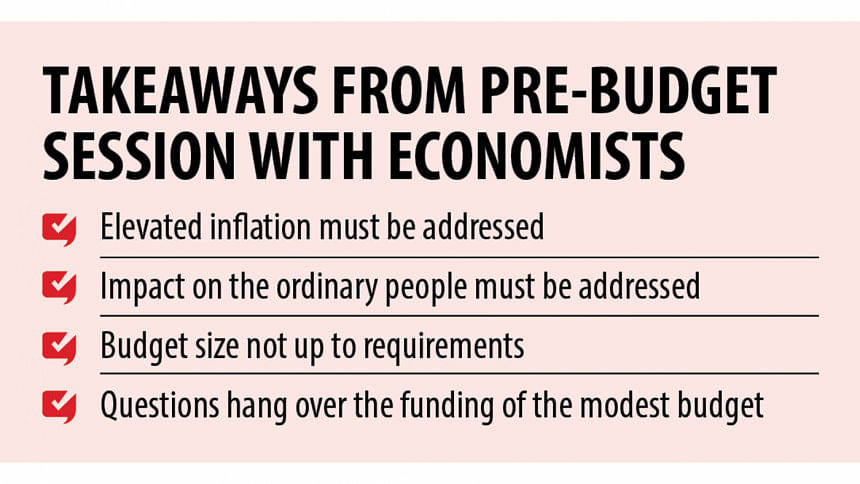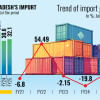FY24 Budget: Focus on inflation, macro stability

Economists yesterday stressed on addressing the persistently high inflation, macroeconomic stability and low revenue base in the pre-budget session for the upcoming fiscal year with the finance minister.
The virtual session was the first in the series for Finance Minister AHM Mustafa Kamal before he sits down to finalise the budget for fiscal 2023-24, the last budget for the current Awami League government's five-year term.
At the session, finance ministry officials did a presentation on which recommendations of the economists did they accommodate in this year's budget and their impact.
The International Monetary Fund's timebound conditions for the $4.7 billion loan, the persistently elevated inflation and the upcoming polls are weighing heavy on the finance ministry's mind as it does its computations for the forthcoming budget.
The next fiscal year's budget is likely to be Tk 750,165 crore, about 10.6 percent higher than this year's.
But economists said the budget falls short of the requirement, The Daily Star has learnt from officials informed with the contents of the meeting.
The issue of budget implementation was also discussed. Due to weak capacity, budgets invariably get revised down every year.
The issue of funding the budget was discussed given the low revenue base.
"The budget will be extremely challenging to fund, realistically," said Ahsan H Mansur, executive director of the Policy Research Institute of Bangladesh.
For funding, the government has become central bank-dependent, which is not right as it is inflationary.
The government has to come out of this practice as inflation will get worse otherwise.
In the first eight months of the fiscal year, inflation averaged 8.74 percent, way above the budgetary target of 5.6 percent, according to data from the Bangladesh Bureau of Statistics.
"Besides, the Bangladesh Bank is printing money through the refinance packages -- which a parallel budget. How you are going to control this budget of BB?"
Chief among the conditions agreed with the IMF is raising the tax-GDP ratio to 11 percent from about 8 percent at present, which Mansur, a former economist of the Washington-based multilateral lender, said would be difficult for the government to implement in the upcoming budget.
"It is not possible to implement in this budget but you can try in future. But there must be some sort of announcement of the planned tax reforms in the budget. How we will modernise the tax system and administration? How will our tax-GDP ratio will rise to 11 percent? In this budget, we want to see some tax exemption withdrawal," he added.
Selim Raihan, executive director of SANEM, echoed the same.
"Scaling up tax-GDP ratio in line with IMF's conditions will not be easy," he said, The Daily Star has learnt from people familiar with the discussions.
Reforms under the IMF programme should be transparent and the relevant stakeholders must be engaged. The progress can be monitored, too.
"We want to see how the reforms in tax, banking sector and public fund management are panning out."
There is intense inflationary pressure in the economy and it is exerting tremendous stress on low and middle-income households.
"This must be immediately addressed," said Raihan, also a professor at the University of Dhaka's economics department.
He also called for ensuring macroeconomic stability.
"There might be a brewing global financial crisis -- we need to be careful. At the same time, we must give emphasis to stimulating private investment and attracting foreign investment in a big way in light of LDC graduation," he added.
Rehman Sobhan, chairman of the Centre for Policy Dialogue, called for addressing the income inequality and abnormal wealth accumulation by a few.
The budget must have an indication that the government is serious about recouping money from defaulters, he said, according to meeting participants.
He also called for ensuring that loan defaulters do not get a nomination to contest in the polls.
As per law, loan defaulters cannot be candidates in the polls. But they tend to reschedule their soured loans just before the nomination papers are due to get rid of the defaulter tag.
"This is manipulation to get election participation. We must not circumvent the law," Sobhan added.
Meanwhile, Binayak Sen, director general at the Bangladesh Institute of Development Studies, said the poverty rate has come down to 14-15 percent and extreme poverty to less than 10 percent in the forthcoming Household Income Expenditure Survey.
However, economists expressed scepticism about the drop in the poverty rate amid the elevated inflation for a good year or so.
"The way that the price level is increasing, and the impact it had on low and middle-income people, it is counter-intuitive that the number of people below the poverty line would decline. However, we have to see detailed figures to pass an informed judgement," Mustafizur Rahman, distinguished fellow at the CPD, told The Daily Star.
Rahman did not attend the virtual session with Kamal.
"At the end of the day, the monetary situation must be stabilised. The exchange rate must be unified and the interest rate must be hiked. Otherwise, macro stability will not come and budget implementation will not be possible," said Mansur, also the chairman of Brac Bank.
Former BB governors Salehuddin Ahmed and Atiur Rahman, former finance minister M Syeduzzaman, UNDP's country economist Nazneen Ahmed, Mustafa K Mujeri, executive director of Institute for Inclusive Finance and Development, former finance secretary Mahbub Ahmed, Hannana Begum, an economics professor, attended the session among others.

 For all latest news, follow The Daily Star's Google News channel.
For all latest news, follow The Daily Star's Google News channel. 








Comments